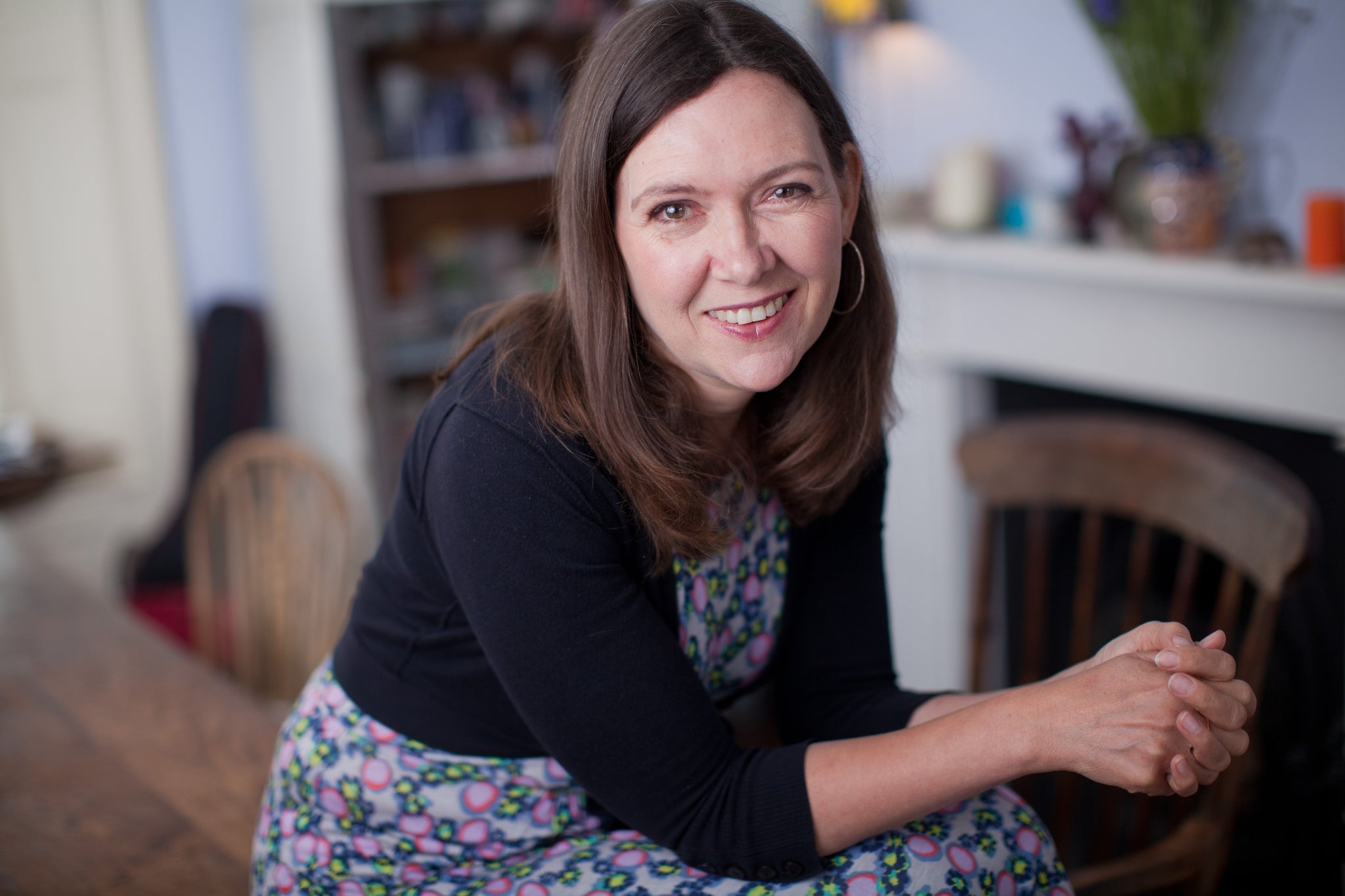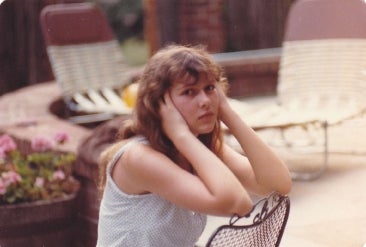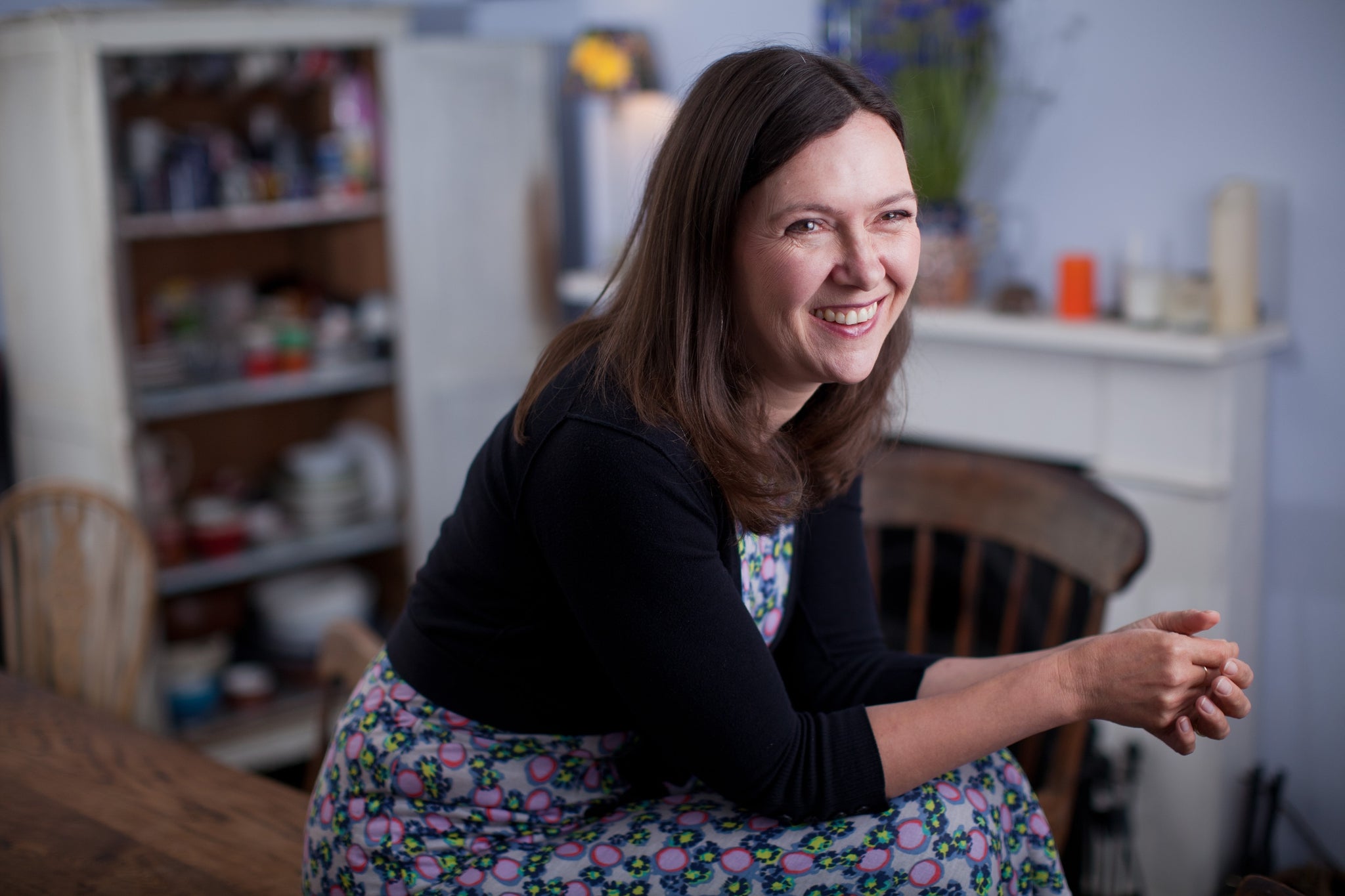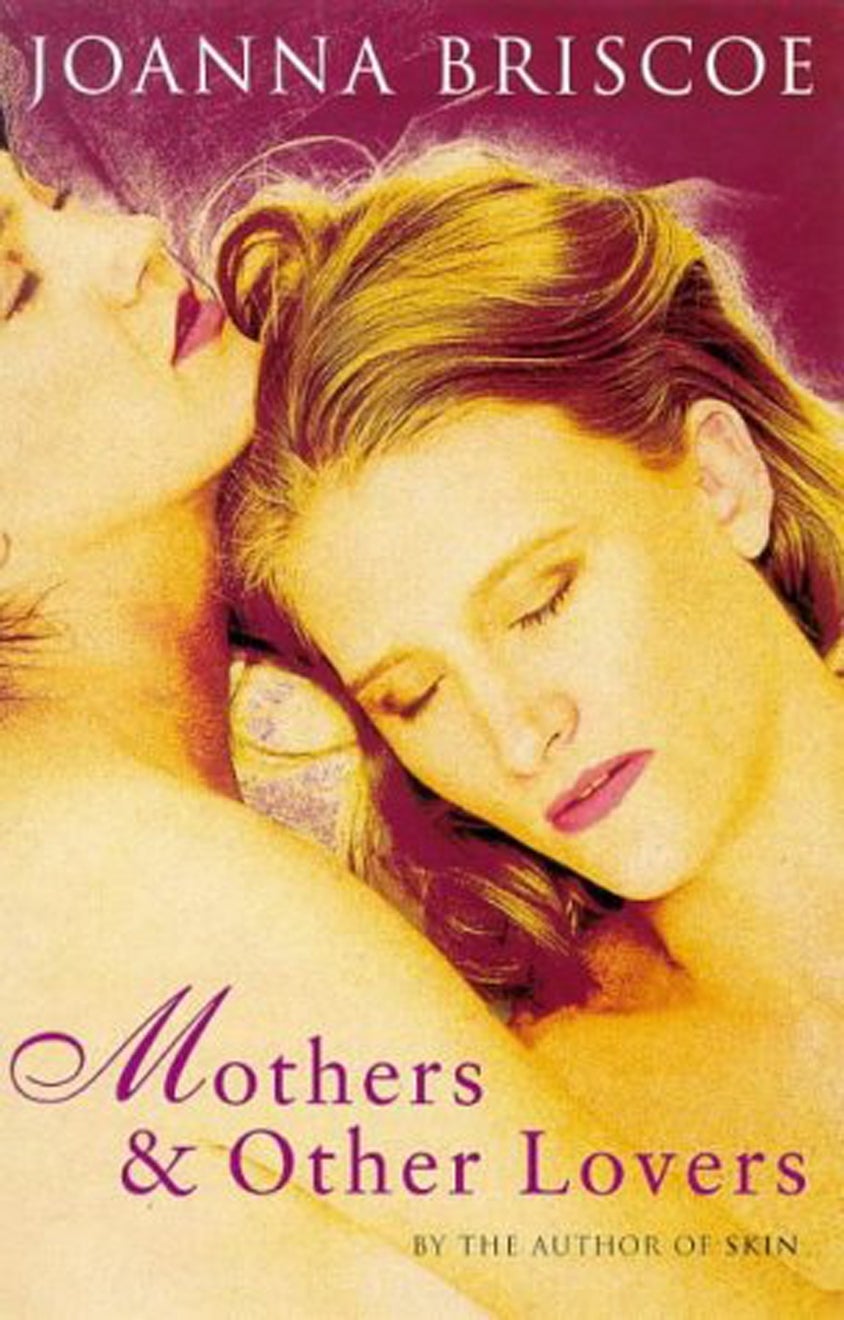I wanted to tell you a story: The tale of author Joanna Briscoe
Raised in the wilds of Devon, the urge to write caught Joanna Briscoe young and for half her life, despite endless rejections, she thought that having a novel published would somehow complete her

Your support helps us to tell the story
This election is still a dead heat, according to most polls. In a fight with such wafer-thin margins, we need reporters on the ground talking to the people Trump and Harris are courting. Your support allows us to keep sending journalists to the story.
The Independent is trusted by 27 million Americans from across the entire political spectrum every month. Unlike many other quality news outlets, we choose not to lock you out of our reporting and analysis with paywalls. But quality journalism must still be paid for.
Help us keep bring these critical stories to light. Your support makes all the difference.
The novel inside us. It’s a powerful presence that commonly remains dormant but ruminated over, then abandoned with a little wistful regret. In other cases, it is nothing less than a raging obsession.
In these poor lunatics, and I am one of them, it takes the form of a compulsion sufficiently urgent to madden its victim unless the desire to write is fulfilled. And, like the wish to have a baby, it’s always the first novel that is the focus of overwhelming need, with subsequent offspring and publications being mere bonuses.
A YouGov poll earlier this year that revealed that “author” is Britain’s most desirable profession – with a whopping 60 per cent longing for this torment – contained some surprises. The figure was 24 percentage points higher than “TV presenter” and 29 percentage points higher than “movie star”. Why, oh why? Wouldn’t the nation rather be Angelina Jolie than Hilary Mantel? It seems not.
Indeed, anecdotally – and the ubiquity of creative-writing courses will attest to this – the longing to write and have a novel published appears to be as common an affliction as fibroids, insecurity or an addiction to box sets. What about travelling the world or finding deathless love? These, it seems, are but nothing compared with sitting in solitary confinement with a backache crying over paragraphs that won’t work.
Objectively, it’s mystifying, yet I can’t argue, since my own compulsion was of the virtually ill, insanity-inducing variety. From the age of 10, I couldn’t stop writing stories; at 15, I committed to a career as an author, after considering the lowly professions of ballet dancer, showjumper and actress (as well as star of pop videos, for no apparent reason – even the possessed teen fantasist that I was was unable to lay claim to singing abilities).

And so that holy grail and poisoned chalice, the first novel, stamped itself on my psyche, and equipped me with both blinkers and a source of joyful fantasy. I truly, truly believed that completing and publishing a novel would grant me a trouble-free life. It would anoint me, save me, airlift me from my humdrum existence. A tortuous journey was ahead before I would find out the truth.
So, to a 15-year-old living in the depths of a Devon moor, commitment was very real. I read and read and reread, that reading more immersive and joyful than any adult experience of literature, and all I wanted to do was write. Sylvia Plath wrote: “I write only because/ There is a voice within me/ That will not be still.” And indeed, the idea of not interpreting life on a page seemed inconceivable.
Every day, after a painstaking homework session, I sat myself in my bed and wrote for exactly an hour, marking it off on my calendar. I now envy the discipline of the innocent dreamer as I worked on a children’s novel: a full-length episodic non-page-turner featuring meadows, bracken and bearded fathers. I imagined I was the Laura Ingalls Wilder of Dartmoor. I wrote and wrote, the plan being publication for the first time by 16, which was not quite as precocious as I had hoped.
What seems strange to me now is the solitude, the clandestine nature of the enterprise. Teens are and were, surely, supposed to be masturbating, smoking or practising eyeliner manoeuvres in their bedrooms. Instead, I was frowning over a manuscript, gazing at my Laura Ashley wallpaper for inspiration, and goading myself when tired. I kept it entirely secret from parents and best friends, confiding only in my younger sister, who was my trial readership.
This was not so much about worldly ambition, though it seemed that way to me then, as a need to experiment with prose and rewrite my world. It was a potential escape route from mud, and a plan to rescue and prove myself.
And I needed, then as now, to set the world to rights, reorder it more prettily, dredge up the darkness that I am still barely conscious of until it appears, twisted and surprising and faintly gothic, on the page. Writing a novel, I’m convinced, is a neurotic exercise. Why else would you shut yourself away from other people, from the world of useful work, camaraderie, shared purpose, and make up a string of lies in total isolation? Fashion a world that is different from the one you inhabit, yet crystallises what is universal?

Yet somehow, for all the agony, it soothes my soul to write. Festering psychological horrors are brought to light. Lives are invented and made anew. The shapes, concealments and twists of storytelling form a puzzle that brings great satisfaction in the solving. Writing isn’t all about wish fulfilment or catharsis, but about some kind of pleasing reordering. It is where we have rare control, even as some mysterious voice does seem to take over; the subconscious is mined; the writer can explore what they barely dare to in real life.
So there was something liberating, yet quite sad and desperate and frenzied, about this precocious desire of mine. I would read Laurie Lee, Thomas Hardy, Vladimir Nabokov, and be transported by the novel above any other art form. At 15, despite national and international ambitions, every tiny symbol of hope seemed significant in the microcosm I inhabited and, mid-plod, there was one moment of consummate joy. Our school’s resident deity, my Cambridge-educated Robert Redford-a-like of an English teacher, famed crush figure, and mentor for any secret would-be writer, asked me to stay behind after class one day.
A spasm of dread shook me. What could I have done wrong? Fears of expulsion or an A-minus gripped me. I stood there trembling, while, in a scene recalled in forensic detail, he spoke first to a boy called Craig from Sheffield. I waited in a fugue state. The boy departed; the deity looked up from his books. “Ah, Joanna,” he said. “I just thought you’d like to know you came top in both exams.”
My fate was sealed. Top in English in a class of comprehensive-school kids. The Booker was upon me. Every night, the scene was replayed in the bath like a feature film, mentally shot from different angles, a prologue added, my own reactions analysed. After a whole month of re-enactments, I had to put a ban on screenings of Top in English, because they were distracting me from both sleep and work.
Again, such furious mental self-abuse now seems quite demented. Or perhaps not. So circumscribed was my world, so urgent the need to transcend my shy, plain, substandard status, perhaps this was a healthier escape plan than glue sniffing.
The pastoral whimsy that was All About Anna was finished and typed up by my father’s secretary, who repositioned inverted commas through the entire typescript. With Tipp-Ex, I corrected her corrections, then sent the package to Penguin. I was already feeling pretty old. The Jackson Five, Nadia Comaneci and Bonnie Langford had all come before me.
The manuscript was returned with a rejection slip. The shock was possibly the biggest of my life up to then, a sense of crashing inadequacy compounded. Through my tears, I sent it to other publishers, having no idea, on Dartmoor, about literary agents. A round of rejections followed, the despair deepening.
Doggedly, I did it again. The calendar was marked off, with more world-weary sorrow this time, as I drove myself through a second full-length children’s novel. It was rejected. One editor wrote: “Do carry on writing. You have a real feeling for words.” A couple of other personal letters were there among the standard rejection slips that arrived, blow after blow, down my lane.
By 17, I was clearly mature: blasted by life’s experiences, bent low but still determined. So I began the adult masterpiece that was Roxanne. Roxanne was a quite remarkably beautiful schoolgirl. But also a semi-genius, unusually sensitive and, on later perusal, a raging snob. Her English teacher was in love with her, but they couldn’t have sex in a hotel as Roxanne’s author – by chance the same age as Roxanne – didn’t know anything about that. So the work was abandoned at the moment the heroine was waiting in bed for her Heathcliff, who seemed to have the first name “Mr”. Roxanne wore a nightie and a peach-coloured cardigan. Truly. No wonder Mr never ravished her.
I left school a rejected girl novelist.
At university, immersed in Shakespeare and Milton, I faltered, cowed and distracted by real-life intrigues. The mark on the calendar was replaced by feverish diary writing and an all-consuming love life. I wanted to have written a novel. I temporarily forgot that to do so, you have to write one. Yet still it was there as a symbol, something that would save me, and a fantasy that functioned as a buffer between me and normal life, because one day…
That first novel was still the endpoint of all dreams. I, and my entire life, would change after it. Friends went off travelling. I stayed in a hall of residence, setting myself six hours of writing a day, ending up doing none, and thinking that staying in London was somehow vital for my writing. Readers, don’t do it. Don’t put your life on hold to write a novel. Don’t turn down trips to Bhutan for the sake of your 500 words a day, and a half-chance of a party that a junior editor might be at. Don’t put off children, wildness, love affairs. It’s not worth it.
In fact, they will help, even as they hinder. No one wants to read a novel set entirely in a library or a publishing party. I didn’t understand this till my thirties. Believe me. Wealth, fame, success: none of it is worth putting real life and relationships on hold for. I always love Jim Carrey’s quote: “I wish everyone could get rich and famous and have everything they ever dreamt of so they would know that it’s not the answer.”

George Orwell famously wrote: “All writers are vain, selfish and lazy, and at the very bottom of their motives lies a mystery. Writing a book is a long, exhausting struggle, like a long bout of some painful illness. One would never undertake such a thing if one were not driven on by some demon whom one can neither resist nor understand.”
With this career comes paranoia, misery, withdrawal. The feeling of failure is endemic. You can never, ever match that perfect glow of a novel that lives in your imagination. Yet there is something thrilling in the merging of craft and art, a sense of creativity and power. You need nothing but paper and pen and yourself. That fact alone seems wonderful to me.
The manuscript that did indeed become my first novel was something I worked on in different drafts through my twenties, confidence sapped. I eked out fiction time as I made my living as a journalist; the journalism took off and the stimulation of a regular byline was an easy distraction from toiling over 80,000 words on my own, and there were years of false starts, small publications in the form of short stories and a non-fiction book in my mid-twenties. But they, and all the features I wrote for newspapers and magazines, meant very little to me, because they weren’t the novel. I got an agent. I still believed, with a puerile kind of faith, that the first novel would change everything, because how could it not?
I remember despairing, alone in a flat in Paris full of cockroaches, rearranging my cut-up manuscript in its umpteenth draft on the floor as though wrestling an untameable beast. Writing a novel was so much more difficult than I had ever expected that I was filled with something close to panic, and my twenties were running out with no ISBN to show for them.
I was full of shame at my failure. However, without my knowledge, my agent had submitted my manuscript for a Betty Trask Award for first novelists under the age of 35. She rang to tell me I had won one. The moment of pure, amazed ecstasy almost matched Top in English. It was the unexpected nature of this, the surprise of a good thing landing from nowhere, and in that moment I assumed, as my agent did, that publication would follow. Instead, 11 rejections followed. Back on the roller coaster. The agony of being unable to get an award-winning manuscript published was worse than the rejection by Penguin exactly half a lifetime before.
Then, suddenly, three publishers made offers in the same week. The moment I got the first – the call telling me that Orion wanted to publish – I couldn’t speak. I had to hand the phone to the friend who was in the room.

I was scheduled to go to Crete the next day with friends, and so we went in celebratory mode, my life’s aim seemingly complete. I remember lying on the beach, riding on a speedboat, getting drunk, and trying to feel the height of ecstasy I had anticipated. It wouldn’t come. I was very happy, greatly relieved, at times thrilled, but the moment I had focused on for the previous decade and a half simply could not match the anticipation. And the horizon hadn’t turned Technicolor, and my English teacher hadn’t rung to declare his love.
I tried so hard to grasp that elusive magic, but I could only ever catch it obliquely, when least expected. At the same time, there was something else that I had never spent a second considering: a sense of loss. There was the loss of the dream life that had sustained me, been my companion, my drug. The years had been hung on this moment. A layer of my life had gone. The run-up was arduous yet in some ways blessed, suspended in hope and fantasy that was more delicious than the reality could possibly be, just as people so often find on attaining wealth. The post-moment world was untethered and, in time, riddled with fear: the realisation that a novel was not a permanent artefact, that it could even go unstocked, unnoticed, unreviewed, unsold; though mercifully this didn’t happen. But what that first publication did do was to rid me of frustration and a self-imposed sense of failure, and for that I’m grateful.
I have just sold my sixth novel, and I no longer believe it will be my salvation, but despite everything, the need to write drives me on. I think of my English teacher telling me I’d come top in the class. I was 15. Fifteen years later, I was a published novelist for the first time. Which was better? I know.
Joanna Briscoe’s latest novel, ‘Touched’, is published by Hammer
Join our commenting forum
Join thought-provoking conversations, follow other Independent readers and see their replies
Comments